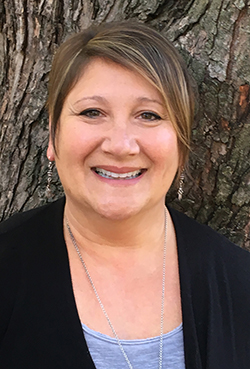Breast Cancer Survivor
Support and Preparation Fuel Fight
 Jennifer Forman-Wright couldn’t be more thankful that her husband is an eternal optimist. When she told him a tumor deep in her right breast was detected during a routine mammogram, he calmly told her that everything would be okay. She held on to his words and, today, Jennifer is cancer-free.
Jennifer Forman-Wright couldn’t be more thankful that her husband is an eternal optimist. When she told him a tumor deep in her right breast was detected during a routine mammogram, he calmly told her that everything would be okay. She held on to his words and, today, Jennifer is cancer-free.
Even though we have a family history of cancer, receiving a diagnosis of Grade 2 invasive ductal carcinoma that was ER+/HER2- was a complete surprise.
A friend referred me to a breast surgeon. After considering my family history, the type of cancer, the risk of additional cancers and my age (44), I chose a bilateral mastectomy with reconstruction, followed later by a complete hysterectomy. Independent of my decision for the surgery, I had genetic testing for the BRCA genes and learned I didn’t have them.
The cancer had spread to my lymph nodes. I had Stage II cancer and would need chemotherapy. I kept in mind the words of one of my mother’s friends, who also happened to be a wise female breast surgeon, “She is cancer-free. Chemo is just the insurance policy.”
Our two-year-old didn’t understand much, so I told her there might be times when Mommy’s body would feel sick. The conversations with our eight-year-old were more factual. I answered her questions, but I never got ahead of her with information. I wanted to help ease her anxiety, so my best friends helped us throw a “Goodbye to the Ta Tas” party prior to my surgery. We used body paint, decorated drinking glasses and colored our hair blue before cutting mine short.
When my mom had chemotherapy for her breast cancer, she envisioned the drugs as little soldiers marching through her bloodstream fighting off the cancer cells. I thought of the drugs as a rainbow ribbon, flowing through my body, cleaning out the cancer cells and making everything better.
I’d bought wigs and turbans to prepare for hair loss, and my nurse navigator prepared me for other side effects. The mouth sores were miserable, but I found a homemade remedy that worked quickly. I also had scalp pain and a metallic taste in my mouth. Lymphedema is an occasional issue. I don’t like wearing a sleeve, but I do wear one when I exercise and when I fly. My occupational therapist was a tremendous resource.
Reconstruction was long and challenging. It’s so important to find a plastic surgeon who will explain what your reconstruction is and what it’s not. It’s not a “boob job.” Your surgeon is going to try to make things look like you want them to, but there is a lot more to it.
I encourage you to ask for help and accept it. My husband really stepped up. Having him there during my appointments gave me permission to tune out when my brain and my body became overwhelmed with information. My mom also was a huge source of support. Both took over when people asked me how they could help.
Now, I'm cancer-free. I see my oncologist annually, and I also take a drug to prevent recurrence. I’m becoming comfortable with simply knowing I’m now well.


